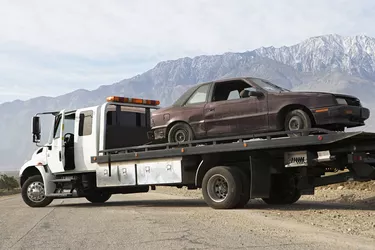
Tow truck drivers must possess a commercial driver's license to operate a tow truck in North Carolina. To obtain a license, applicants must be at least 18 years of age if operating within the state. Individuals towing across state lines must be at least 21 years of age. All licensed drivers must be legal residents of North Carolina and meet state physical requirements.
Commercial Driver's License Types
Video of the Day
The license needed depends on the size of the tow truck and cargo. Tow trucks and cargo with a combined weight of at least 26,001 pounds require a Commercial Class A license. Drivers towing vehicles of 10,000 pounds or more also require a Class A license. Individuals towing vehicles less than 10,000 pounds require a Class B license.
Video of the Day
Physical Requirements
Drivers can have no loss of limb such as a hand, foot or leg. All limbs must be functional with no injury that impedes the ability to grasp vehicle mechanisms such as steering wheels or gearshifts. Distance visual and binocular acuity scores must be 20/40 or better in each eye with or without the aid of glasses or contacts. Horizontal peripheral vision must be 70 degrees in each eye. Peripheral vision refers to the ability to view objects from the side, while focusing on a central point. Drivers must hear a whispered voice at 5 feet or more without the aid of a hearing aid. Hearing loss can be no more than 40 decibels if tested with an audiometric machine.
Medical Conditions
Insulin-dependent diabetics do not qualify for a commercial driver's license. Applicants with heart disease accompanied by fainting, fainting spells or congestive heart failure cannot get a commercial license. Other disqualifying conditions include high blood pressure, arthritis, epilepsy or any other disease that interferes with the ability to manage a tow truck. Individuals with mental or nervous disorders do not qualify for a commercial license if the disorder prevents the safe operation of a tow truck.
Interstate Towing
Individuals wishing to tow across state lines must supply the review officer with a Department of Transportation physical report, doctor's statement and an employer letter. Doctor's statements must detail the driver's disability, medical prescriptions and an assessment of the applicant's ability to operate a tow truck. Employer letters must list employment length, work hours, driving areas and the type of tow truck. Self-employed tow truck drivers need an employer letter.
Testing
All commercial driver applicants must complete the General Knowledge Test. Drivers must complete the Combination Vehicles Test and the Air Brakes Test if the truck has air brakes. Tests with a score of 80 percent or better remain valid for 90 days. Applicants who pass the knowledge tests proceed to the skills tests, which consist of the pre-trip inspection, basic control skills and road tests. These tests evaluate the vehicle's safety and the driver's ability to control and drive the tow truck.
Get a License
Visit a North Carolina driver license office to apply for a license after you're sure you meet the requirements (see Resources). Show documents to verify age, identity, Social Security number, residency and liability insurance. Hold a clean driving record and have no more than one driver's license. Acceptable documentation includes birth certificate, driver's license, Social Security card and passport. An original liability insurance binder or insurance card verifies insurance. Pass all tests and pay license fees. As of October 2011, Class A and Class B commercial licenses cost $15. Minimum liability coverage is $750,000.